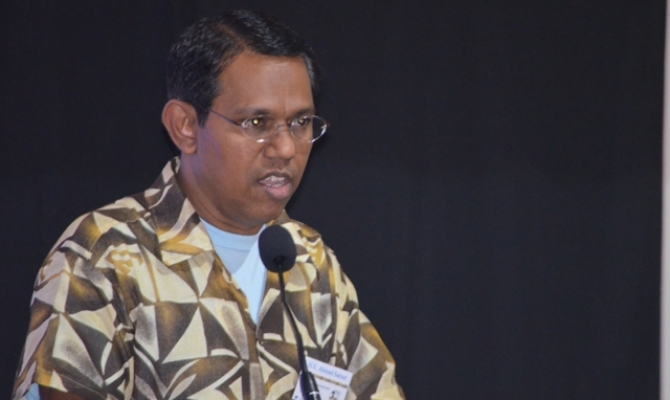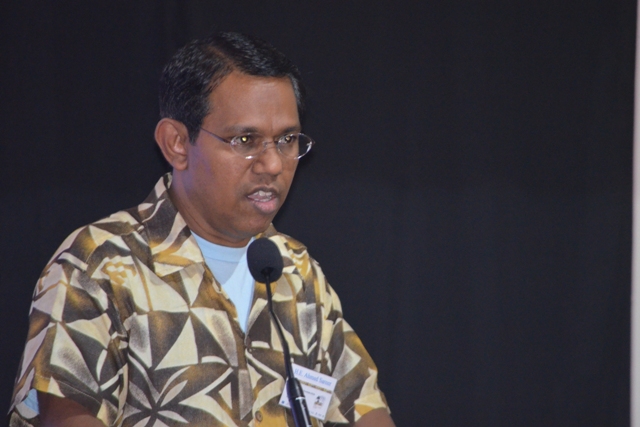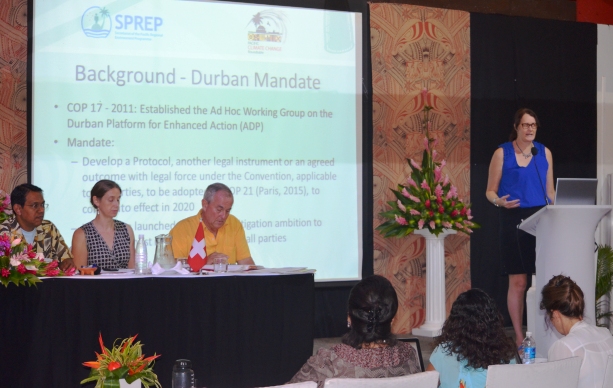
14 May 2015, Apia, Samoa, PCCR - With the biennial Pacific conference on climate change coming to a close in Apia today, AOSIS, the Alliance of Small Island States, of which islands in the region are members of, has put bigger countries of the world on notice: the world's small island states will push for a legally binding loss and damage provision in any global climate change treaty.
The warning was issued by the chair of AOSIS, currently the Ambassador of Maldives to the United Nations, His Excellency Ahmed Sareer when he addressed the Pacific Climate Change Roundtable in the capital of Samoa today.
He said the proposed climate change agreement that needed to be finalised and adopted at the United Nations Conference of the Parties (COP 21) in Paris in December must contain an international mechanism that deals with the inevitable loss and damage countries will face due to the impact of climate change.
The push for adequate climate financing has been a long struggle, Ambassador Sareer told Pacific island delegates, so AOSIS members would not settle for a funding mechanism that offer nothing less than one that is scaled up, adequate, predictable and accessible.
He said the Alliance has not reneged on its ambition that all countries that are members of the United Nations Framework Convention on Climate Change must push for the long-term global goal of limiting temperature rise to well below 1.5 degrees.
In the lead-up to the Paris COP 21 meeting in December, Ambassador Sareer said seeking agreement on the final text of the climate change treaty would be a challenge given the fundamental disagreements that exist among negotiating parties. But groups like AOSIS he said must use the remaining time as effectively as possible.
Ms. Diane McFadzien, the climate change adaptation adviser with SPREP – the Secretariat of the Pacific Regional Environment Programme (SPREP) said real negotiations have begun now that Parties have agreed to a draft text which will serve as the basis of negotiations, for the final agreement to be adopted in Paris. This text currently stands at 80 pages, and represents the positions of all Parties in the form of multiple options. Negotiations would need to reduce this draft further, she said.
"Key asks from the Pacific in the negotiations would be the adoption of a legally binding protocol, agreement on a mitigation ambition that is high enough to ensure the long term sustainability of all Pacific island countries, adequate provision for adaptation and mitigation with the view to move away from fossil fuel dependence to a low carbon economy." The Pacific have also asked that loss and damage be included in the new agreement.
Ms McFadzien added a series of technical and high-level meetings are being planned from between now and COP 21 in December for Pacific island climate change negotiators and leaders.
This includes a meeting in Apia tomorrow (Friday) of island government negotiators and advisers. Other meetings included one for Pacific ministers of meteorology in Fiji in July and the Pacific Island Forum Leaders in Papua New Guinea in September. A High Level Support Mechanism for Pacific Ministers going to Paris will also be held in Apia, Samoa, in November.
The Pacific Climate Change Roundtable is held from 12 – 14 May in Apia, Samoa. The PCCR is coordinated by SPREP with the guidance from a steering committee on a biennial basis.
The PCCR has been made possible with support from the Government of Switzerland, Government of Samoa, Government of Australia, European Union, GIZ, United Nations Development Program (UNDP), Secretariat of the Pacific Community (SPC), Pacific Islands Forum Secretariat (PIFS), University of the South Pacific (USP) and the Pacific Council of Churches (PCC). Additional funding support was provided by the EU-GIZ Adapting to Climate Change and Sustainable Energy (ACSE) Programme, and Climate Analytics through its High Level Support Mechanism (HLSM) project as well as the United States Agency for International Development (USAID).– Samisoni Pareti/#pccr2015

